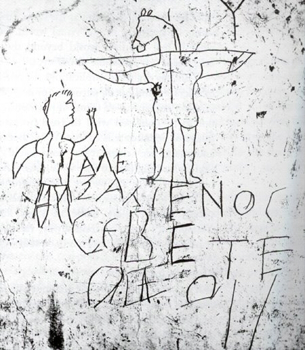Revised: 15-Feb-2008
For Christians the suffering that Jesus endured, especially on the cross, has far reaching spiritual, theological and doctrinal significance. Accordingly, the cross has assumed a place of prominence in both Catholic and Protestant symbolism. Over the course of Ecclesiastical history the cross, however, on occasion became distorted into a symbol associated with Christian triumphalism. Horrible deeds were perpetrated under the cross’ banner by those bearing the name “Christian.”
One community that suffered more than any other when the symbol of the cross became distorted was the Jewish community. Even today it carries deep scars from centuries past—some from the Crusades, others from the Inquisition, and so on. Nevertheless, returned to its most fundamental historical context the cross is in reality a symbol of solidarity for Jews and Christians.

Philo the Jewish philosopher, who was a contemporary of Jesus and who lived in Alexandria, Egypt, told of an event where a Gentile mob incited by a Roman official seized a mentally impaired man, clothed him in royal attire, and addressing him Lord, petitioned him to render judgment. The whole episode was a big farce intended to degrade and mock. But what were the Roman underlings mocking? Though the visiting Jewish King Agrippa was the immediate target of their ridicule, this incident, like the one recorded by the gospel writers, is likely another example of Roman degradation of Jewish messianism. Jesus and this mentally ill man were apparently two of an untold number of unfortunate individuals, whom having tricked out in royal apparel, the Romans or their sympathizers publicly humiliated in order to mock the Jewish people’s longing for their messiah.
Rabbi Nathan who lived about a century after Jesus, but still under Roman oppression, once asked rhetorically in front of an audience, “Why are you going forth to be crucified?” The answer was, “I ate unleavened bread [for Passover]”—something Jesus and his disciples would have done each year.
The point of the above is that pagan Rome did not understand or appreciate the spiritual achievements of Judaism. In its quest to control the Levant, Roman soldiers and underlings were known to mock Jewish messianic expectations and, as Josephus’ writings inform us, even crucify Jews living a life of obedience to their ancient faith. The cross upon which Jesus was hung in its most fundamental historical context is a symbol of solidarity for Jews and Christians. Whether one is a believer in Jesus’ claims or a practicing Jew adhering to the tenants of Rabbinic Judaism, the historical records bear out that Jesus was mocked, tortured, and executed by Roman soldiers because of obedience to the Jewish faith of his forefathers.
*This article appeared in print in the Times Record News of Wichita Falls, Texas on March 28, 1997. The article draws from David Flusser’s Jesus (Jerusalem, 1997), 169, and Brad Young’s “The Cross, Jesus and the Jewish People,” Immanuel (1990).






























































































